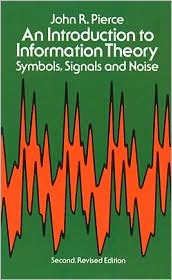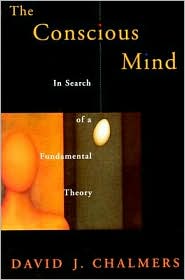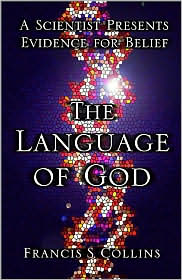Of Time and Creation
This was particularly true in view of the (admittedly, less than ironclad) philosophy-of-mind argument that consciousness qua consciousness is explanatorily irrelevant at the level of physical cause and effect, where natural selection does its thing.
 But nowhere in this speculation, which was based an argument Robert Wright presents in his book Nonzero: The Logic of Human Destiny, was there any hint of how God creates the (living) world. Even if we assume that God somehow uses evolution by natural selection as an instrument of his creation, which would make the Darwinian process but a proximate cause of our being a species here on earth, we still don't know, really, what it means to say that "God did it," or that "God was behind it."
But nowhere in this speculation, which was based an argument Robert Wright presents in his book Nonzero: The Logic of Human Destiny, was there any hint of how God creates the (living) world. Even if we assume that God somehow uses evolution by natural selection as an instrument of his creation, which would make the Darwinian process but a proximate cause of our being a species here on earth, we still don't know, really, what it means to say that "God did it," or that "God was behind it." As I said in that earlier series of posts, in the philosophical discipline which undergirds one of Wright's most telling arguments, philosophers of mind such as David J. Chalmers, author of The Conscious Mind: In Search of a Fundamental Theory, speak of different kinds of necessity, where "necessity" refers that which could not be otherwise ... in contrast to "contingency," that which would be different if something that it depends on were different.
As I said in that earlier series of posts, in the philosophical discipline which undergirds one of Wright's most telling arguments, philosophers of mind such as David J. Chalmers, author of The Conscious Mind: In Search of a Fundamental Theory, speak of different kinds of necessity, where "necessity" refers that which could not be otherwise ... in contrast to "contingency," that which would be different if something that it depends on were different.Chalmers says (contrary to those who would argue otherwise, be it noted) that, in our world, consciousness necessarily appears whenever there is suitable functional organization (such as that of the physical level of our brain). This is a case of "nomic necessity," says Chalmers. According to the glossary of technical terms which is downloadable in PDF format here,"A proposition (or a sentence expressing a proposition) is said to be nomically necessary just in case it is necessary by virtue of natural laws. For example, the proposition that metals expand when heated is nomically necessary."
That contrasts with "metaphysical necessity": "A proposition (or a sentence expressing a proposition) is said to be metaphysically necessary just in case it is necessary by virtue of metaphysical truths. For example, if the correct metaphysics of the constitution of water says that water is H2O, then it is metaphysically necessary that non-H2O stuff even if clear, potable, odorless, tasteless, etc. is not water."
That's admittedly quite abstruse. I think of metaphysical necessity as that which is so "locked into" the basic scheme of things that not even God can change it. If consciousness were metaphysically necessary, then Chalmers would be wrong. There couldn't possibly be a "zombie world," an alternate universe where the brain's functional organization produces no sentience. But if that sort of organization produces consciousness only in worlds like ours, then nomic, natural law-based necessity is at work instead.
Neither nomic nor metaphysical necessity explains God's world-creative act, it seems to me: how divine creation works, how it is done. If a world like ours is metaphysically necessary, then there is nothing else to explain. And if a world with the laws of nature we observe were nomically necessary, there would be an insoluble chicken-and-egg problem.
We could accordingly say that the existence of the world is entirely contingent on God's creative activity. That, indeed, would seem to be the standard theological position: that God freely creates the world and is under no compulsion of necessity in doing so.
But between that free act of creation and the lawful, nomic necessity we observe through our science, there may be, operating at some level, a different kind of necessity. To see why that makes sense — if you are a believer in the Christian version of God, at least — consider what I said about the Biblical understanding of time in a post to another blog, Time, the Bible, and the Kingdom of God.
 Evolution has to do with, first of all, events in time [I said in that post]. Albert Nolan's Jesus before Christianity says time, in the Bible and in Jesus's understanding of it, is quite different from our modern concept. In Chapter 11, "A New Time," Nolan says we think of time as a quantitative measuring tool, a yardstick for events. That's anything but biblical. In the Bible, time can't be separated from events.
Evolution has to do with, first of all, events in time [I said in that post]. Albert Nolan's Jesus before Christianity says time, in the Bible and in Jesus's understanding of it, is quite different from our modern concept. In Chapter 11, "A New Time," Nolan says we think of time as a quantitative measuring tool, a yardstick for events. That's anything but biblical. In the Bible, time can't be separated from events.Time in the Bible has a qualitative nature — philosophers would call it "phenomonological" — by means of which each individual "time" in history is characterized by God's intentions for that particular time. Those intentions present themselves to us through the "signs of the times," provided we can read them.
The signs of the times are events. But events which we think of as happening in the future were, in the minds of Jesus and the Jews in his day, already in existence. They were already conditioning events visible today.
Specifically, to Jesus the kingdom of heaven or kingdom of God, though still to come from our point of view, was already a reality. The kingdom could not not come, in the fullness of time.
That sounds to me like a form of necessity, concealed within our (false) understanding of the future as wholly contingent and as yet undetermined.
But, as I say, it's not metaphysical necessity. If it were, God would not be free not to establish it. And it's very unlikely to be nomic necessity, since if it were, the world would surely be entirely deterministic ... and most Christian theologians say man must be possessed of free will, so as to be able to freely accept God's offer of salvation.
So what kind of necessity could it be?
There's one more type of necessity listed in the glossary of technical terms, analytic necessity: "A proposition (or a sentence expressing a proposition) is said to be analytically necessary if it is necessary in virtue of its meaning. For example, many believe that the sentence 'bachelors are unmarried' is analytically necessary."
My admittedly odd idea here is that some aspects of world history — the directionality of evolution, the emergence of consciousness, the coming of God's kingdom — are analytically necessary.
Some utterance has been made, by virtue of the meaning of which certain "events" have been established in existence. Even though we may see these events, according to our perceptions of time, as yet-to-be-determined, they aren't really.
Put another way, the Biblical sentence "the kingdom of heaven is at hand" ought to be read as a proposition which, when properly recast — "the kingdom of heaven is undeniable" or "the kingdom of heaven is inevitable" — makes the "coming" of said kindgom analytically necessary.
But whose utterance is it? Clearly, it is God's. God, I am suggesting, speaks in analytically necessary propositions. For example, what I'm thinking is that "Let there be light" ought to be construed as an analytically necessary propostion.
We hear a lot in the Christian Bible — see the opening verses of the Gospel of John — about the Word of God, also known as the Logos. The Word of God, or Logos, is said to be identical with Jesus Christ, who is (according to later Christian theology) also the Second Person of the Holy Trinity, the Son of God the Father. (The Father is the First Person, the Holy Spirit the Third Person.)
This idea of Word of God or Logos is not easy to grasp, which is why most Christians kind of brush by it. For that matter, the triune Godhead or Holy Trinity is not an idea most believers are inclined to expatiate on.
But the Greek word Logos is the one we derive our word "logic" from. Things which are analytically necessary are a subset of things which are logically necessary, as if "All men are mortal/Socrates is a man/Therefore, Socrates is mortal" were collapsed into a single statement.
In other words, Logos is the power of utterances to become necessary truths by virtue of what they contain within themselves, without any reference whatsoever to anything outside those utterances.
We are told in the Bible that God has that power — in fact, God, in Christ, is that power.
Let me accordingly speak of "logos power." Logos power makes propositions that ordinarily would not seem so, analytically necessary. If we set aside temporal considerations of the future versus the present, these propositions are "always already true" because, for reasons independent of either metaphysical or nomic necessity, they could not be otherwise.
When we humans cogitate upon analytically necessary statements like "bachelors are unmarried," we honor — but do not ourselves possess — the logos power implied in the statement.
But God actually — and uniquely — has logos power: the ability to turn seemingly contingent declarations into analytically necessary ones.
If this admittedly half-baked notion of mine is correct, then God's creative acts inhere in what one might call "logos utterances": utterances that turn otherwise contingent declarations into analytically (i.e., internally) necessary ones.
The value of taking divine creative acts to be analytically necessary "logos utterances" is that doing so takes them out of the realm of potential conflict with the outworkings of natural laws. The latter, which are clearly at work in the history of biological evolution by natural selection, produce at most only nomic necessity. If God's mode of genesis is analytically necessary and not nomically necessary, then the two realms of necessity are orthogonal to one another.
There is accordingly no reason why we cannot speak of the truth of evolution by natural selection and also the truth of God's genesis. One is nomically necessary; the other is, by virtue of God's "logos power," analytically necessary.

















0 Comments:
Post a Comment
<< Home